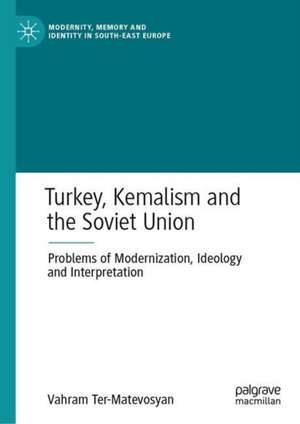Turkey, Kemalism and the Soviet Union: Problems of Modernization, Ideology and Interpretation: Modernity, Memory and Identity in South-East Europe
Autor Vahram Ter-Matevosyanen Limba Engleză Hardback – mar 2019
Din seria Modernity, Memory and Identity in South-East Europe
- 17%
 Preț: 523.82 lei
Preț: 523.82 lei - 15%
 Preț: 702.05 lei
Preț: 702.05 lei - 15%
 Preț: 471.69 lei
Preț: 471.69 lei - 15%
 Preț: 584.26 lei
Preț: 584.26 lei -
 Preț: 380.84 lei
Preț: 380.84 lei - 18%
 Preț: 780.37 lei
Preț: 780.37 lei - 18%
 Preț: 786.36 lei
Preț: 786.36 lei -
 Preț: 386.81 lei
Preț: 386.81 lei - 15%
 Preț: 499.59 lei
Preț: 499.59 lei - 18%
 Preț: 892.11 lei
Preț: 892.11 lei - 15%
 Preț: 581.14 lei
Preț: 581.14 lei - 18%
 Preț: 887.68 lei
Preț: 887.68 lei - 18%
 Preț: 780.82 lei
Preț: 780.82 lei - 15%
 Preț: 643.16 lei
Preț: 643.16 lei - 15%
 Preț: 698.80 lei
Preț: 698.80 lei
Preț: 502.54 lei
Preț vechi: 591.22 lei
-15% Nou
Puncte Express: 754
Preț estimativ în valută:
96.17€ • 100.04$ • 79.40£
96.17€ • 100.04$ • 79.40£
Carte tipărită la comandă
Livrare economică 15-29 aprilie
Preluare comenzi: 021 569.72.76
Specificații
ISBN-13: 9783319974026
ISBN-10: 3319974025
Pagini: 252
Ilustrații: XVII, 279 p. 1 illus.
Dimensiuni: 148 x 210 mm
Greutate: 0.51 kg
Ediția:1st ed. 2019
Editura: Springer International Publishing
Colecția Palgrave Macmillan
Seria Modernity, Memory and Identity in South-East Europe
Locul publicării:Cham, Switzerland
ISBN-10: 3319974025
Pagini: 252
Ilustrații: XVII, 279 p. 1 illus.
Dimensiuni: 148 x 210 mm
Greutate: 0.51 kg
Ediția:1st ed. 2019
Editura: Springer International Publishing
Colecția Palgrave Macmillan
Seria Modernity, Memory and Identity in South-East Europe
Locul publicării:Cham, Switzerland
Cuprins
Introduction.- Problems of Definition and Historiography of Kemalism. – (Trans)Formation of Kemalism, 1920s - 1930s.- Popularization of Kemalism: Intellectual, Contextual, and Popular Considerations.- Transformation of Kemalism’s Hegemony in the Post-Atatürk Era, 1940s – 1950s.- Kemalism in the Second Republic, 1960s - 1970s.- Problems and Perspectives of Existing Interpretations of Kemalism.- Soviet Interpretations of Kemalism in the 1920s.- Geopolitics and Complexities of Soviet Interpretations.- Conclusion.
Recenzii
“A significant and exceptional contribution to the study of Kemalism. … a remarkable intervention from the Soviet perspective for a more thoroughgoing picture of Kemalism literature. Accompanied with the meticulous and thorough engagement with the sources from different languages, types, and in-depth interviews, this intervention renders the book a valuable resource for the students of Kemalism, Turkey, and the Soviet Union.” (Sümeyye Sakarya, Journal of Soviet and Post-Soviet Politics & Society, JSPPS, Vol. 49 (1), 2022)
“Turkey, Kemalism and the Soviet Union is a comprehensive analysis of Kemalism that provides a fresh outlook and fills a gap in our understanding of Kemalism’s genesis and development by integrating the Soviet perspective. … this book is highly recommended for scholars in the fields of contemporary Turkish history and politics.” (Hryhorii Mavrov, Insight Turkey, Vol. 23 (1), 2021)
“Ter-Matevosyan’s book is indispensable for researchers studying the roots of modern Turkey and its ideology. At the same time, it offers an important contribution to the history of the Soviet Union, its ideology and foreign policy.” (Naira Sahakyan, Ab Imperio, Issue 4, 2019)
“Turkey, Kemalism and the Soviet Union is a comprehensive analysis of Kemalism that provides a fresh outlook and fills a gap in our understanding of Kemalism’s genesis and development by integrating the Soviet perspective. … this book is highly recommended for scholars in the fields of contemporary Turkish history and politics.” (Hryhorii Mavrov, Insight Turkey, Vol. 23 (1), 2021)
“Ter-Matevosyan’s book is indispensable for researchers studying the roots of modern Turkey and its ideology. At the same time, it offers an important contribution to the history of the Soviet Union, its ideology and foreign policy.” (Naira Sahakyan, Ab Imperio, Issue 4, 2019)
Notă biografică
Vahram Ter-Matevosyan is Associate Professor and Chair of the Political Science and International Affairs Program of the American University of Armenia. He is also Senior Researcher (former Chair) in the Turkish Studies Department at the Institute of Oriental Studies at the National Academy of Sciences of Armenia.
Textul de pe ultima copertă
This book examines the Kemalist ideology of Turkey from two perspectives. It discusses major problems in the existing interpretations of the topic and how the incorporation of Soviet perspectives enriches the historiography and our understanding of that ideology. To address these questions, the book looks into the origins, evolution, and transformational phases of Kemalism between the 1920s and 1970s. The research also focuses on external interpretations by observing how republican Turkey and particularly its founding ideology were viewed and interpreted by Soviet observers. Paying more attention to the diplomatic, geopolitical, and economic complexities of Turkish-Soviet relations scholars have rarely problematized those perceptions of Turkish ideological transformations. Looking at various phases of Soviet attitudes towards Kemalism and its manifestations through the lenses of Communist leaders, party functionaries, diplomats and scholars, the book will illuminate the underlying dynamics of Soviet interpretations.
Caracteristici
Offers new insights into the history of Kemalism by introducing Soviet perspectives on Kemalist ideology Charts changing Soviet attitudes to Kemalist ideology in Turkey, paying close attention to the diplomatic, geopolitical and economic complexities of Turkish-Soviet relations Explores the ideological encounters between two former Eurasian empires which both experienced painful transformations in the aftermath of World War I
